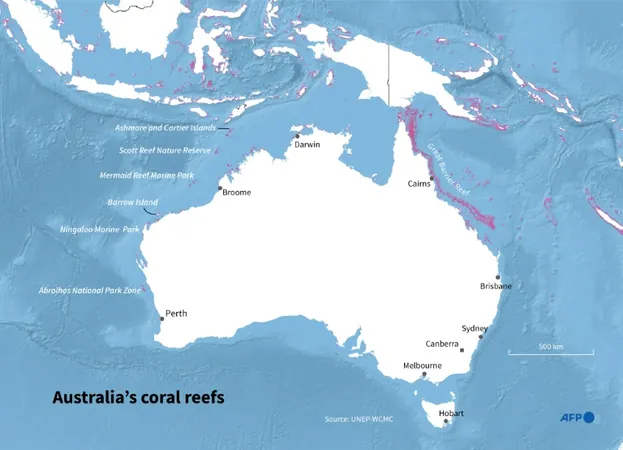
'Unprecedented' Mass Bleaching Devastates Australia’s Ningaloo Reef: What It Means for Our Oceans
2025-03-26
Author: Daniel
A shocking new report reveals that an "unprecedented" mass bleaching event is currently wreaking havoc on Australia's Ningaloo Reef, a stunning marine ecosystem famous for its vibrant corals and whale sharks. Scientists noted that massive areas of this UNESCO World Heritage site are being reduced to a ghostly white, raising alarms for marine biodiversity and ecosystem health.
According to ocean scientist Kate Quigley, a prolonged marine heatwave has severely impacted the reef. “Warm oceans have just cooked the corals this year,” she explained, emphasizing the widespread nature of the bleaching. Initial data suggests this could be the worst mass bleaching event since 2011, affecting various coral species rather than just superficial layers.
This bleaching event is part of a larger, ongoing phenomenon known as the fourth global coral bleaching event, which began earlier this year. Data indicates that from January 1, 2023, through March 20, 2025, a staggering 83.6% of the world's reef areas have experienced significant bleaching-level heat stress, impacting 81 countries globally, according to Derek Manzello from the U.S. National Oceanic and Atmospheric Administration (NOAA).
Quigley further noted that the ocean waters around Western Australia have been recorded at temperatures up to three degrees Celsius higher than average, a critical threshold that has triggered this alarming biological response. Coral bleaching occurs when stress factors — in this case, warmer water — cause corals to expel the colorful algae that give them their vivid hues, leading to weakened and sick corals. While Quigley pointed out that bleaching does not immediately result in coral death, prolonged stress could be fatal.
Adding to the crisis, smaller patches of coral bleaching have been reported in the northern regions of the equally famous Great Barrier Reef on Australia's east coast. The simultaneous occurrence of bleaching in both major reef systems is rare, highlighting the severity of the situation as global temperatures continue to soar. This summer, Australia experienced record-high sea surface temperatures, which scientists attribute to climate change, heightened by human activities such as overfishing and pollution.
Despite the disturbing trend, Quigley reassured that not all coral bleached during this event is doomed to die. However, she expressed deep concern for the overall health of these ecosystems. “When we take a national snapshot, it's extremely concerning,” she stated. With the Great Barrier Reef having suffered five mass bleaching events in the past eight years, the researchers agree that ongoing environmental stressors threaten the survival of coral species worldwide.
As the world grapples with climate change and its effects on marine life, immediate action is called for to mitigate factors contributing to such catastrophic events. Efforts to reduce CO2 emissions and protect marine environments are crucial if we wish to preserve our oceans and their magnificent coral ecosystems for generations to come.
Will we wake up in time to save these underwater treasures before they vanish forever? The message is clear: it's urgent that we take action now!


 Brasil (PT)
Brasil (PT)
 Canada (EN)
Canada (EN)
 Chile (ES)
Chile (ES)
 Česko (CS)
Česko (CS)
 대한민국 (KO)
대한민국 (KO)
 España (ES)
España (ES)
 France (FR)
France (FR)
 Hong Kong (EN)
Hong Kong (EN)
 Italia (IT)
Italia (IT)
 日本 (JA)
日本 (JA)
 Magyarország (HU)
Magyarország (HU)
 Norge (NO)
Norge (NO)
 Polska (PL)
Polska (PL)
 Schweiz (DE)
Schweiz (DE)
 Singapore (EN)
Singapore (EN)
 Sverige (SV)
Sverige (SV)
 Suomi (FI)
Suomi (FI)
 Türkiye (TR)
Türkiye (TR)
 الإمارات العربية المتحدة (AR)
الإمارات العربية المتحدة (AR)